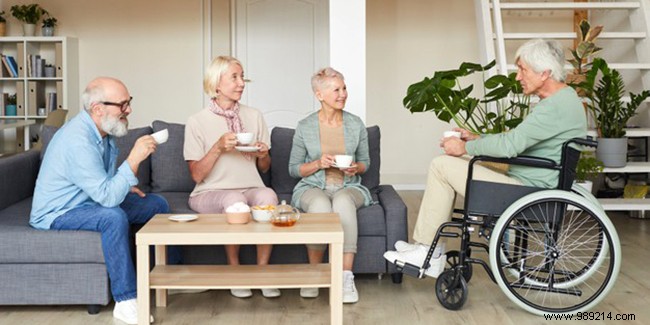
Grouped housing proves to be an ideal solution for seniors who wish to continue to live in independent accommodation and not to integrate an establishment specializing in the reception of the elderly. Regrouped housing is aimed at all seniors, with or without a loss of autonomy, wishing not to be isolated in particular and to share a social life project with other residents.
Group housing for seniors, also called beguinage or inclusive housing, is a good alternative for dependent elderly people in particular who do not wish to integrate a residential establishment for dependent elderly people ( Ehpad), when they can no longer live alone at home. But grouped housing is also aimed at all seniors, dependent or not.
Grouped housing is most often managed by associations or local authorities. This type of housing designates the possibility of continuing to have a personal life in private accommodation while enjoying the advantages of living in a community. Grouped housing residences generally include accommodation for 5 to 15 other elderly inhabitants in the same situation. In addition, grouped housing provides the elderly who live there with additional services, such as meal delivery, laundry, etc., which make life easier for residents.
Most often, these types of residences for the elderly are located near the places where they used to live when they resided in their former home. Congregated housing takes the form of small sets of independent housing, often located in city centers.
On the other hand, to facilitate meetings between residents, but also with their relatives, these grouped habitats provide common areas accessible to all, such as rooms that can be reserved for organizing a family celebration.
In the context of grouped housing, a senior has a private residence as owner, tenant or co-tenant, and shares common premises with other residents. Depending on their state of health, they can request personalized services in health, social or medical matters, such as assistance and support services in the acts of daily living, home nursing services (SSIAD) or multipurpose home help and care services (SPASAD).
In a grouped habitat, each senior resident benefits from accommodation adapted to their state of health, particularly in terms of mobility.
On the other hand, the grouped habitats make sure to offer affordable rents to senior tenants, in particular because it is most of the time the local authorities which are at the initiative of these housing projects and give them a social vocation, while offering services that make life easier for the elderly who live there.
In addition, grouped housing gives its residents the opportunity, if they meet the conditions, in particular related to their resources, to benefit from housing assistance such as personalized housing assistance (APL) or housing allowance. (ALS), as well as the personalized autonomy allowance (APA) intended to cover necessary expenses for seniors with a loss of autonomy who remain living at home.
Regrouped housing represents, for seniors, a project of shared social life which aims to promote "living together" to limit the risk of isolation of residents, develop collective life within the habitat (organization of communal, cultural, sporting, etc. activities), or even allow residents who want and can to integrate into the life of their neighborhood and the municipality where they live.
Seniors who decide to integrate a grouped habitat must adhere to the social life project defined in each residence of this type. They are also involved in setting it up afterwards.
Grouped housing in particular gives seniors the opportunity to deploy or maintain social ties, with the neighborhood for example, as indicated by the national information portal for the elderly and their relatives for-the-elderly. gouv.fr.
In order for the elderly people welcomed to keep as many links as possible with the "outside world", grouped housing always offers places of residence close to transport, shops and public services in general.